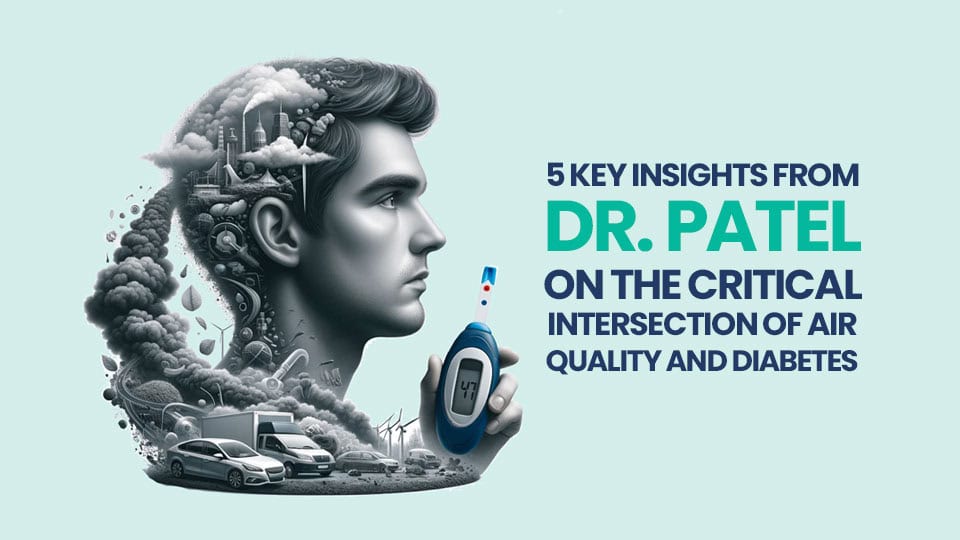Introduction
Air Quality ..when considering risk factors for diabetes, air quality might not be the first thing that comes to mind. However, research, including key studies highlighted by Dr. Patel, reveals a surprising link between the two. In this blog post, we will delve into the connection between air quality and diabetes risk, the underlying mechanisms, and strategies for mitigating risk.
The Scope of the Problem: Diabetes and Air Pollution
Diabetes, a chronic metabolic disease characterized by high blood sugar levels, is a significant public health issue affecting millions worldwide. The conventional risk factors for diabetes include obesity, a sedentary lifestyle, poor diet, and genetic predisposition. However, emerging research, such as that referenced by Dr. Patel, suggests that environmental factors like air quality also play a role. Air pollution is a ubiquitous environmental hazard, resulting mainly from industrial activities, vehicle emissions, and the burning of fossil fuels. Fine particulate matter (PM2.5), a common air pollutant, has been particularly linked with an increased risk of developing diabetes.Understanding the Link: Dr. Patel’s Perspective
Dr. Patel, a noted expert in the field, often draws attention to the growing body of research connecting poor air quality with an increased incidence of diabetes. In one groundbreaking study published in The Lancet Planetary Health (2018), researchers found a significant association between air pollution, particularly PM2.5 exposure, and increased risk of diabetes globally, even at concentrations considered safe by the World Health Organization.The Underlying Mechanisms: How Does Air Pollution Contribute to Diabetes?
The question that Dr. Patel and other researchers in this field are trying to answer is: how does air pollution contribute to diabetes development? The answer appears to lie in inflammation and insulin resistance. Air pollutants, especially PM2.5, can induce systemic inflammation when inhaled into the lungs. This inflammatory response, Dr. Patel explains, can eventually lead to the development of insulin resistance, a key precursor to type 2 diabetes. Furthermore, these fine particles can directly impact the pancreas, disrupting its function and leading to impaired insulin production.Mitigating the Risk: What Can Be Done?
Understanding the link between air quality and diabetes underscores the importance of addressing air pollution as a public health issue. Policies aimed at reducing air pollution could play a significant role in decreasing the prevalence of diabetes. Individuals can also take steps to mitigate their personal risk. As Dr. Patel suggests, these may include staying indoors on days when air quality is particularly poor, using air purifiers at home, wearing a mask in areas of high pollution, and maintaining a healthy lifestyle to lower overall diabetes risk.Conclusion: A Call to Action from Dr. Patel
The interconnection between air quality and diabetes brings a new perspective to our understanding of the environmental determinants of health. As Dr. Patel emphasizes, it is not enough to focus solely on traditional risk factors for diabetes. A holistic approach, incorporating environmental interventions to improve air quality, alongside lifestyle modifications, could be the key to reducing the global burden of this chronic disease. Remember, every breath we take is an interaction with our environment; making that interaction as healthy as possible could be a step towards preventing diabetes.Do you have any further questions about Air Quality and Diabetes?
If you have any further questions about Air Quality and Diabetes, you can schedule a consultation with Dr. Patel. Dr. Patel was recognized on the Dean’s list at Herman Ostrow’s School of Dentistry of USC. He completed his Certification in Periodontics at the University of Pittsburgh School of Dental Medicine. Dr. Patel completed his residency in periodontics from the University of Pittsburgh and he is eligible for board certification. He is an active member with the American Academy of Periodontics and the American Dental Association. Please get in touch with our office for your consultation now!

